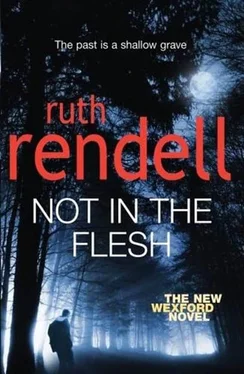Burden raised his eyebrows. “Tredown by all means,” he said, “but why now?”
“He can't live long. I suppose I pity him. I may be wrong, but I imagine him lying in that place-that very nice place, I'm sure-regretting what he's done, regretting that he stole Samuel Miller's manuscript. Because I think it was Miller's. I think Miller wrote The First Heaven, or at any rate wrote an outline for it or a draft.”
“That roughneck? That knife-carrying lowlife?” Wexford had never seen such a look of distaste mixed with incredulity on his friend's face. “Claudia Ricardo told you he was always getting manuscripts sent him by people he'd taught in creative writing classes. Why not one of them?”
“Look at the facts, Mike. Eleven years ago Tredown and the two women were scraping along on what Tredown was making out of those books of his. That and the little bit he got from teaching. And it would have been a little bit. There aren't that many creative writing courses in this country and the ones there are don't pay generously. Neither of the women worked, remember. Claudia boasted that she'd never worked in her life.
“Then along comes Samuel Miller. A roughneck, a lowlife, as you put it, but have we any reason to believe great artists-for the author of The First Heaven is or was a great popular artist-have we any reason to believe such people are all respectable middle-class law-abiding citizens? Genet spent most of his life in prison, Marlowe died in a tavern brawl, Baudelaire was a syphilitic drug addict-no, that argument doesn't work.”
“You're saying Miller brought this manuscript with him on a couple of weeks of fruit picking in Flagford? Would he have known Tredown lived here?”
“Why not? He may have attended one of Tredown's classes. The fact that Bridget Cook doesn't know it means nothing. This would have been three years before Bridget met him. Even if he hadn't been Tredown's student, pupil, or whatever, the location of Tredown's home if not his actual address appears on the jackets of his books. Can't you imagine him finding out fruit-pickers were wanted in a Sussex village called Flagford and that name resonating with him?” He could see he had awakened Burden's interest-more than that, his enthusiasm. Burden's face wore that narrow-eyed speculative look that commanded his features when he was on the verge of excitement. He had drawn his brows together. “Go on,” Wexford said. “You take it from there.”
Burden nodded. “Okay. So he's written this book or done this plan and draft or whatever they do and he takes it with him to Flagford in the hope he may find a way of seeing Tredown. Probably he doesn't know the field they set up camp on is next door to Tredown's house, but he soon finds out. They haven't been camped there that long when Grimble junior and his pal Bill Runge turn up and drive them off the land with sticks…”
“Or guns.”
“Or guns. The fruit picking's done or at an end anyway, Miller makes his way into Tredown's garden, offers his services as gardener and handyman, and at some point while he's working there tells Tredown he has this manuscript with him and would Tredown take a look at it. How's that?”
“Much what I'd have said myself,” said Wexford.
“It's not so easy after that, though, is it? I mean, does Tredown just say yes, fine, I'd love to, there's nothing I'd like better than wasting a week reading your rubbish? I don't think so.”
Wexford laughed. “I don't think so, either. But remember, I've read The First Heaven. I didn't much fancy reading it, I thought I might manage a chapter or two, but once I'd started I recognized it was good. I didn't enjoy it, it's not the kind of thing I like, but I could see others might, thousands of others might.”
Burden was looking at him in a kind of wonder, with that look on his face a man might wear when he hears that an acquaintance has an obsession for some esoteric pursuit, learning Farsi, for instance, or studying sea anemones. But he tried. He concentrated. “You mean,” he struggled, “Tredown might have sort of glanced at it not to be-well, not to be rude. He's a very courteous man, don't you think? And then he went on, rather like you, he had a job to put it down, and he sort of read to the end and…”
“And wondered how he could get hold of it for himself,” Wexford said. “How he did I can't quite see, but somehow he did. Did he buy it from Miller? Or steal it? I could believe one or both of those women somehow cheated Miller out of it.”
“Then Tredown needed to check accuracy and invited Hexham down. I don't like that much, Reg. Why didn't Hexham tell his wife he was going to call on Tredown after he'd been to that funeral?”
“Come to that,” said Wexford, “why didn't he tell his wife anything about where he was going after the funeral, whether it was to visit Tredown or anything else? He didn't, that's all. But he went somewhere and ended up in that trench in Grimble's Field. Did he somehow find out that Tredown intended to pass off someone else's work as his own? He may have threatened to make what he knew public and was killed for it. We don't know what happened to Miller either, except that he left Tredown and went home, wherever his home was at that time. Three years later he came back.”
“And blackmailed Tredown over that book. Maeve or Claudia gave him a thousand pounds to keep him quiet, not a hundred pounds for a wedding present. If he hadn't gone into Grimble's house and got himself shot by Ronald McNeil, I wonder how long it would have been before one of those women killed him.”
“I think you're right, Mike,” Wexford said as he heard his front door open and close again. Dora came into the room with Sheila and Sylvia behind her.
“Why are you two sitting in the dark?” she said after saying hello to Burden.
“I hadn't noticed we were. How was your meeting?”
Sheila put her arms around him and kissed him. “I can't stay, Pop. It'll take an hour for Clive to drive me home as it is. By the way, Matea Imran was there. She said her parents are back from Somalia and Shamis is all right. Syl will tell you all about it.”
The Imrans had returned home the day before. Of the family, only Matea had been at the meeting. “She made a point of coming up to me,” Sylvia said, “and telling me her sister hadn't been circumcised. She'd been mistaken about that.”
“Really?” Wexford saw Burden out, given a lift home in Sheila's car. “I wouldn't believe a word that girl says,” he said to Sylvia.
She was shocked. “Dad! I thought you liked her.”
“Liking doesn't come into it. In the circumstances I don't trust her. This is her family, Sylvia. Whatever she may have said at first, coming here and telling me what she was afraid of. Now she knows a bit more about it.”
Dora laid her hand on his arm. “I can understand,” she said. “Even if they'd done that awful thing to her sister, she won't want her parents sent to prison. She won't do what she'd think of as betraying them.”
“Quite,” he said. “I couldn't have put it so well myself.”
“Then what are you going to do, Dad?”
“I'm going to bed,” said Wexford, “and tomorrow I shall have a word with Dr. Akande.”
Raymond Akande was Nigerian and a doctor of medicine, his wife, Laurette, a sister tutor at the Princess Diana Hospital in Stowerton, from Sierra Leone. Soon after Dr. Akande became his GP, Wexford had identified a murder victim as their missing daughter Melanie-on the grounds only, as he had harshly put it to himself later, that both the living and the dead were black. Akande forgave him quickly; with Laurette it took a little longer but they were friends now.
“The family are on my list,” Akande said when Wexford told him his suspicions about the Imrans, “but that doesn't mean I can march in there and demand to examine a little girl's vulva.”
Читать дальше











